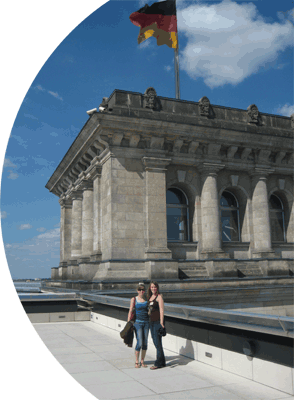
Before I left for Germany this summer with the support of the Nanovic Institute research grant I was nervous at the prospect of leaving with only a goal in mind and a vague idea of where to find the information I needed. I had never had the opportunity to conduct original research, and I was both eager and apprehensive to experience the hardships and successes that would go along with such an undertaking. It turned out that my time in Germany was one of the best learning experiences of my life.
Working with an already existing research project, Sophie: A Digital Library and Resource Center for Early German-Speaking Women’s Works 1740-1923, I went to Germany to track down the extant writings of a little known female author, Elisabeth Heinroth (1861-1920), to discover if she had left a bequest of personal papers and to recover any existing biographical information. Since only one of her nineteen novels and an extremely short biography were accessible, this was an opportunity for me to break away from more predictable thesis research and analyze works which have never before been studied, while at the same time adding to the insufficient canon of German women’s works accessible to scholars.
I started my research in Berlin at the State Library where I was able to locate eleven of the books I intended to find and copy. As ecstatic as I was at this success, the real benefit of the State Library was the familiarity I gained with the German library system. It is very different from the United States library system and the understanding I gained through the Nanovic Institute Research Grant is integral to my education and will help me in my future academic path as well as throughout my entire career.
In Berlin I was able to stay with a Notre Dame graduate who had received an internship to work in the German Bundestag. Thus, I was not only able to conduct ample research in my time in Berlin but also had the chance to tour the German Reichstag building and to meet people from all over the world who are interested in German politics and the German language. I learned an incredible amount from them. I was even invited to an event commemorating the 40th anniversary of Prague Spring, at which Angela Merkel, the German Chancellor, spoke, as well as the leaders of the Czech Republic and Slovakia, and the Czech national orchestra performed. It was one of the most memorable events of my life.
I left Berlin on a search for more information, which took me to the cities of Celle, Göttingen, and Leipzig, where I knew that Heinroth had lived, to search small archives and city halls which do not have catalogues available online. I had to simply hope they would contain information I needed. In this time I was able to locate five more of Heinroth’s novels, some biographical information, a picture of her, and a speech concerning her importance given in the early 1900’s. I enjoyed this portion of the trip immensely, as I got to meet with other scholars, and, for the first time, to see what small European archives were like and understand their importance and how to utilize them. At the same time I saw portions of Germany which I had never before seen, such as Celle, a small town seemingly in the middle of nowhere, but which houses a castle, and some of the most beautiful architecture I have ever encountered. While sitting in a park there, I was also approached by many residents simply to talk. I loved being able to communicate and connect with people of the culture I hope to be part of for the rest of my life.
One of the greatest benefits of my research trip was that it forced me to learn to write formal letters and correspond with scholars across Germany. Throughout the trip, I had been emailing various scholars at universities and libraries in the hopes that they might have some information regarding my author. Eventually I was put in contact with two archives of handwritten papers, and I was able to procure copies of eight handwritten letters from Heinroth to other intellectuals of her time.
With the aid of a Nanovic Institute Summer Travel and Research Grant to Germany I found a huge amount of information which will help me greatly in writing a successful senior thesis this year and hopefully in being accepted to graduate schools in the future. The five weeks I spent in Germany this summer were unforgettable. The Nanovic Grant allowed me to have both an amazing and challenging learning experience and a truly fun visit to Germany.